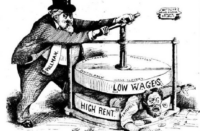Robin Hood, the legendary outlaw known throughout the world, has an unusual connection with Ireland, and an even stranger connection with the communist movement.
No-one knows for certain whether Robin Hood ever existed or was based on a real individual. There are records of people named Robin Hood or similar names in the twelfth and thirteenth centuries. Likewise, there are records of people named Little John and the other Merry Men. There is no definitive proof, however, that any of these were part of an outlaw band under the leadership of Robin Hood.
What is definite is that stories were being told about a Robin Hood and the other outlaws in his band before they were written down. There were other outlaws in the period, but none achieved the lasting fame of Robin Hood and his band.
It is easy to imagine traders entertaining the serfs working in the kitchen of a castle with stories of a brilliant archer who lived as a free man outside the law and who had a sense of decency and justice, unlike the nobility, with their hypocritical codes of chivalry.
Richard Greene was a well-known stage and film actor. Although he was English he had Irish ancestry, and he bought a 154-acre estate at Gorey in Co. Wexford after the Second World War. ITV decided to run a series for television based on the tales of Robin Hood, and Greene agreed to play the part of Robin, which was a considerable coup for ITV.
The series, known as The Adventures of Robin Hood, was aimed at adults. Historians were employed to ensure that costumes, weapons etc. were accurate for mediaeval England. The series, with 143 half-hour episodes, ran from 1955 to 1959. It was hugely popular both in Britain and in America. It is the earliest Robin Hood series still in existence in its entirety.
Following the series Greene then made his only Robin Hood film, The Sword of Sherwood Forest (1960). This was shot on location in Ireland, on the Powerscourt estate in Co. Wicklow. The indoor scenes were shot at Ardmore Studios. Irish accents are prevalent throughout.
The series was made by Sapphire Films. This company was set up by Hannah Weinstein, who was a member of the Hollywood Branch of the Communist Party of America. Shortly after the House Un-American Activities Committee began its witch-hunt of communists in Hollywood, Hannah was sent to London with the finance to set up the company. She used blacklisted writers, such as Ring Lardner Junior (one of the Hollywood Ten), Ian McLellan Hunter, Waldo Salt, Robert Lees and Howard Koch to write the episodes. They all used pseudonyms, and Hannah refused to give the HUAAC any information or co-operation. By living in London she was outside the committee’s control.
The blacklisted writers used the series to comment on social themes. They ignored the origins of Robin Hood, treated him as a yeoman. Besides the general theme of robbing the rich and giving to the poor (redistribution of wealth), they also dealt with betrayal and treachery—all comments on Eisenhower’s America.
Robin Hood as an earl is portrayed by bourgeois writers as a member of the nobility seeking the restoration of his lands and feudal privileges. This can only be achieved by the return of King Richard, the rightful king, who can restore those rights and privileges and thereby maintain the established order.
It was only in the sixteenth century that writers began claiming that Robin was a lord or son of a lord. The original tales describe him as a yeoman, archer, and forester. He had no feudal obligations.
Robin Hood as yeoman is completely different. The yeoman is independent. He does not owe any feudal obligations to a lord or master. It is quite clear from the tales that Robin Hood does not regard the nobility as his “betters.” His very existence turns the world on its head and is a direct challenge to the world of privilege and elitism. He does not need the approval of King Richard: he is already king of the forest in his own right. He takes the king’s deer when he needs to. He is outside the law, i.e. the feudal law of serfdom, feudal rights, church and landlord courts. Robin Hood is a social bandit.






